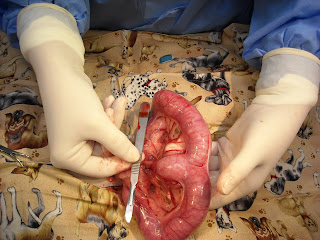
Heiki wasn't feeling quite herself. Normally vivacious, full of life and energy, the first day we saw this wonderful Coton de Tulear, she was a little down. She was fortunate to be owned by a very observant lady who noticed early on when something wasn't quite right and brought her in for an exam. She noticed that her appetite was off the past two days or so, and most significantly, Heike had some clear, shiny discharge from her vulva which she kept trying to lick clean. Her temperature was a bit elevated, too. Heiki's owner also happened to be her breeder-and was very knowledgeable that these symptoms could be signs of trouble with the reproductive tract. She told me that Heike had been bred 3 weeks earlier.
By far, most breedings of dogs happen with no problems at all. But the process isn't exactly sterile, and bacteria can get introduced into the reproductive tract of the female dog during mating. They will migrate up through the cervix, which is relaxed during estrus instead of being closed tightly as it is during the rest of a dog's cycle. The bacteria then start to reproduce in the uterus, creating an infection here we call a pyometra-literally "pus in the uterus."
We can see two types of "pyos," open and closed. These descriptions refer to the cervix, and tell us if the infection is trapped or contained in the uterus creating a life-threatening "balloon" of infected material or if the bacteria and pus is able to drain or leak out of the uterus through the cervix. Both are incredibly serious problems for any dog, much less a breeding female.
Now, the discharge coming from Heike's reproductive tract at this point didn't look like pus-it was clear with no blood or other cells in it at this point. We decided to do an ultrasound exam of her uterus and see just what was going on in there. We shaved some of her glorious long white hair from her abdomen and very quickly confirmed that Heike was, indeed, pregnant. This certainly made our treatment decision more difficult-if it was at all safe to do so, we would like to be able to continue the pregnancy. Since we suspected the discharge could be normal or could be early signs of the pyometra infection we were concerned about, we talked at length with Heike's owner. Another possibility was that the pregnancy was trying to resorb or abort for some reason. We trusted that Heike had the type of owner who could carefully monitor her condition, give medication as directed and watch for the changes we discussed. If Heike stopped eating or started vomiting we wanted her right back in. If her temperature increased, or if the vulvar discharge turned milky or creamy we needed to recheck her. Many dogs with pyometra will start to drink water excessively, so we wanted to watch for this, too. Since we knew she was pregnant, monitoring for a distended abdomen wasn't going to be very helpful. But if she became painful in her belly, that would be a bad sign. We gave Heike a prescription of an antibiotic we felt would be effective for an infection in the uterus but would also be safe for developing puppies, gave her some fluids under the skin to help her hydration and slight fever, and sent her home.
Heike's owner was diligent in medicating her and giving her fluids, orally and subcutaneously. She monitored her vital signs as we asked, and Heike did pretty well for about a week. About that time her temperature actually decreased to below normal and she stopped having any vulvar discharge. We had her come in to reevaluate, and did some blood work and another ultrasound exam. The blood work showed a significant elevation of her white blood cells, a tell-tale sign of infection in the body despite the week-long antibiotic treatment. The ultrasound exam showed that the pregnancy was not progressing as expected. In fact, while we could see the individual vesicles of amniotic fluids, no evidence of feti were found in those vesicles. The uterus itself was very large and fluid filled. With no vulvar discharge seen now, we diagnosed a closed pyometra.
As mentioned before, a closed pyometra is a life-threatening condition. As the uterus fills with pus, the wall of the organ becomes stretched thin and attacked from within by the bacteria, weakening the tissues and making rupture of the organ very possible. The only treatment is an emergency removal of the uterus, hopefully before any rupture or leakage of any amount occurs. We rearranged our schedule and got her right into surgery. It was a good thing we didn't wait.


Normally a thin band of tissue, sometimes even difficult to find among all the intestines and other abdominal contents, Heike's uterus was huge, bulging up right under the incision I made in her abdominal wall. I exteriorized it carefully, revealing the "balloons" we saw on the ultrasound exam.
 While thinning in some areas and obviously very diseased tissue, there were thankfully no obvious tears, ruptures or leaking areas.
While thinning in some areas and obviously very diseased tissue, there were thankfully no obvious tears, ruptures or leaking areas.  Gentle handling was essential to keep that from happening. I wanted to remove the entire pus-filled uterus, along with both ovaries and the supporting tissues without spilling the contents into the surgical site.
Gentle handling was essential to keep that from happening. I wanted to remove the entire pus-filled uterus, along with both ovaries and the supporting tissues without spilling the contents into the surgical site.  Unlike in a human female where the uterus has a simple body, (just fine for a single fetus) the uterus in a dog consists of two "horns," much better suited to accommodate the numerous developing puppies or litter. You can see Heike's diseased uterus kind of looked like big sausages-very abnormal.
Unlike in a human female where the uterus has a simple body, (just fine for a single fetus) the uterus in a dog consists of two "horns," much better suited to accommodate the numerous developing puppies or litter. You can see Heike's diseased uterus kind of looked like big sausages-very abnormal.We were able to remove both of Heike's uterine horns and ovaries without obvious pus contamination of the abdomen, but we flushed out her abdomen with warmed, sterile saline as a precaution, explored the rest of her abdominal organs briefly and found no other problems, and closed her incision. After we removed the diseased organ from her body, we opened it up and found that, sure enough, it was filled with a huge volume of a nasty, strawberry milkshake colored liquid
 that anyone could tell wasn't normal. The entire surgery was less than 30 minutes, but without it, this sweet little dog would certainly have died from that infection.
that anyone could tell wasn't normal. The entire surgery was less than 30 minutes, but without it, this sweet little dog would certainly have died from that infection.It is tempting to treat these dogs like those we have spayed-just a "routine" procedure, especially when they do as well as Heike did. But that would be a mistake, and could have resulted in a decline in her condition later. There was nothing routine about needing to rush to surgery right away. Heike had no time for adequate preparation before surgery, such as fasting, and she was only started on her IV fluids minutes before I made the incision into her abdomen. That uterus was hardly normal, and her blood work showed an obvious affect on her entire body from sepsis or pronounced infection. Her lower than normal body temperature was a sign that her body could no longer handle things on its own and might be facing impending shock. Heike was placed on a different, more powerful antibiotic, one we couldn't use earlier when we had a potential pregnancy to consider. She had aggressive IV fluid therapy and her nurses got her body temperature back up to normal-and kept it there. Her surgical pain was managed well with narcotics before and after surgery, as well as a non-steroidal anti-inflammatory medication. She was also sent home with an appetite stimulant, as getting her to eat right away would be very important to her healing process.
Heike was fortunate that her owner knew the signs of pyometra and how serious it could be. Even if an owner didn't know about this disease specifically, just knowing the "normals" for your pet, his or her normal habits, appetite, activity level, etc. really goes a long way to helping know when something just isn't right. It is the veterinary team's job to then try and figure out why that is-working as a team, we got Heike all fixed up, sent her home to her owner and when we later rechecked her, found that she was the happy, healthy dog she had always been.

But even happy and healthy isn't enough if you are a female dog living with a breeder-and you don't happen to have a uterus! Heike needed to find a new home, and that she did. She actually got to make a plane trip across the country, and now lives with another sweet "cotton" dog, MC. Heike is now known as Olivia-and she couldn't be happier! Her new owner opened her home and heart to this sweet little girl. We are glad that everything has worked out so well for everyone. Good luck, sweet Olivia!

Peace,
DrReneigh

1 comment:
I tried to translate my reader's comment for myself and others. I hope this is accurate...
proswet654 said: loi both Loi as a call in a spirit 囉 wish you well.
Thank you for reading!
Post a Comment